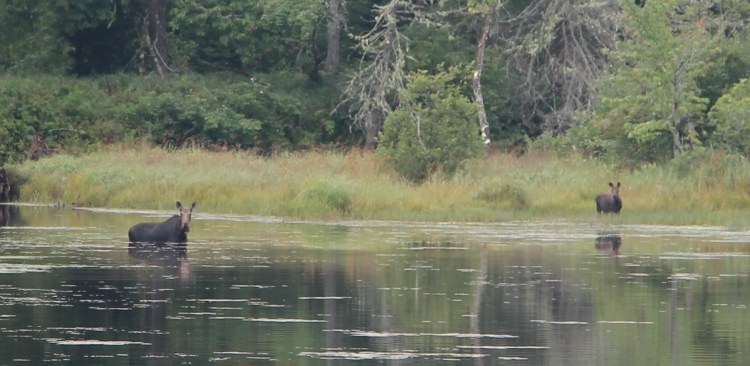
The fall bull moose hunt in western Maine could potentially be split into two weeks for the 2026 season.
Maine Inland Fisheries and Wildlife moose biologist Lee Kantar and assistant regional wildlife biologist Sarah Boyden are visiting towns throughout western Maine to gauge local interest for a potential proposal for a six-day September moose hunt season in Wildlife Management Districts 7-9, 12-15 and 17. This would be in addition to the current six-day October season in each of the zones.
The districts combined cover nearly 9,800 square miles in Oxford, Franklin and Somerset counties, as well as portions of Androscoggin, Kennebec, Penobscot, Piscataquis and York counties.
If the proposal is approved, it would mean permits for the 2026 season would be split between the two weeks. There would not be an increase in the number of moose permits issued.
“These are exploratory meetings, to seek information from towns where there currently is moose hunting, and to see what their thoughts are regarding an additional week of moose hunting in their area. This would not mean more permits, but spreading the hunters out over a two week period, one in September and one in October, like we already do in many Wildlife Management Districts,” Mark Latti, communications director for IF&W, wrote in an email Friday.
Kanter and Boyden attended the Rangeley Board of Selectmen meeting Monday, July 21, and the Eustis Board of Selectmen meeting on Tuesday, July 22, to discuss the potential change.

In Rangeley, Kanter discussed the history of the moose hunt and shared an information sheet about the proposed change.
“We have had the modern moose hunt since 1980,” Kanter said. “A lot of people don’t realize that for the first 20 years, the way the hunt was managed and the timing of the seasons was controlled by the Legislature.”
In 2000, the Maine Legislature gave IF&W the authority to establish, through rulemaking by an advisory council, the timing of the state’s moose hunt seasons, the total number of permits issued, how permits are distributed throughout each district, and the types of permits issued, such as bull, cow and antlerless.
The commissioner’s advisory council is an independent body comprised of members representing the 16 counties of the state, and the state’s native tribes, Latti wrote.

In 2001, the bull hunt in districts 1-6, 11 and 19 was split into two seasons, one in September and one in October. Districts 10, 18, 27 and 28, in the eastern part of the state, followed suit in 2018, as recommended in the 2017 Big Game Management Plan for moose, deer, bear and turkey.
There has been no public pushback since the those districts opened the split season, Kanter said.
The 10-year management plan recommended opening the September season in all districts, however districts 7-9 and 12-14 were not opened because of perceptions regarding public acceptance, Kanter explained.
“It was not established in the WMDs that contain the towns of Rangeley, Eustis, Jackman and Greenville. At the time, there was not support in all of these communities for two weeks of moose hunting so the season remained one week in length in these WMDs. Since that time, our public surveys have indicated that those attitudes have changed, so we are exploring that possibility,” Latti wrote.
The consensus from selectmen and participants in Rangeley on Monday evening was that a split season could have a positive economic impact for guides, lodging, restaurants, and other businesses.
“If we move forward with this, we would advertise the proposed rule, there would be a written public comment period, an advertised public hearing and then it would have to be approved by the commissioner’s advisory council,” Latti wrote.

We invite you to add your comments. We encourage a thoughtful exchange of ideas and information on this website. By joining the conversation, you are agreeing to our commenting policy and terms of use. More information is found on our FAQs. You can modify your screen name here.
Comments are managed by our staff during regular business hours Monday through Friday as well as limited hours on Saturday and Sunday. Comments held for moderation outside of those hours may take longer to approve.
Join the Conversation
Please sign into your CentralMaine.com account to participate in conversations below. If you do not have an account, you can register or subscribe. Questions? Please see our FAQs.